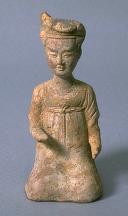Sui (581 - 618)
Yang Chien became emperor in 581 and took the imperial title Wen-ti. A brilliant yet volatile leader, he was devoted to the Buddhist religion and to his wife, who made up for the Emperor’s shortcomings.
Wen-ti centralized his government by controlling the appointments of local officials and sending inspectors abroad to ensure the Emperor’s wishes were being followed. Representatives from each province traveled three times each year to the capital to give an accounting. Afterwards awards and punishments were dispensed. He banned all weapons throughout the kingdom except those within the army, and using forced labor, he repaired the Great Wall, badly damaged by the warring of the previous period.
Though the Emperor’s rule could be harsh, it was also tempered. He built many Buddhist temples and provided training for its clergy, but allowed Taoism to flourish. Concerning matters of state Wen-ti enforced the teachings of Confucius and its tenets of obedience.
Moral character mattered more to Wen-ti than did one’s genealogy, so he opened opportunity for public service to the masses regardless of ethnicity or class. He then published a new legal code containing 1,735 articles, the essence of which was used for centuries.Wen-ti died in 604, and the throne passed to his second son, who took the imperial name Yang-ti. Where his father had spent wisely, the son spent recklessly. Emperor Yang-ti took a small canal project begun by his father and turned it monumental - it was completed six years later and stretched from present-day Hangchow to present-day Beijing. Over five million workers invested their labor in the project. Expensive pomp, construction projects, and military expeditions exacted a heavy toll, and rebellion broke out in 617.
